A constable is a person holding a particular office, most commonly in criminal law enforcement. The office of constable can vary significantly in different jurisdictions. A constable is commonly the rank of an officer within the police. Other people may be granted powers of a constable without holding this title.
Inspector, also police inspector or inspector of police, is a police rank. The rank or position varies in seniority depending on the organization that uses it.
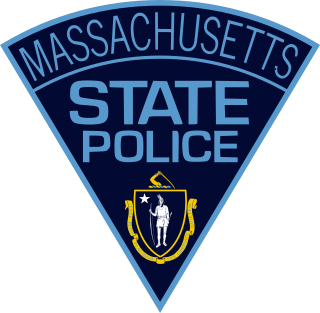
The Massachusetts State Police (MSP) is an agency of the Commonwealth of Massachusetts' Executive Office of Public Safety and Security, responsible for law enforcement and vehicle regulation across the state. As of 2022, it has 2,067 sworn troopers and 611 civilian support staff for a total of 2,678 personnel, making it the largest law enforcement agency in New England. The MSP is headed by Interim Colonel Jack Mawn.

The Pennsylvania State Police (PSP) is the state police agency of the U.S. state of Pennsylvania, responsible for statewide law enforcement. The Pennsylvania State Police is a full service law enforcement agency which handles both traffic and criminal law enforcement. The Pennsylvania State Police was founded in 1905 by order of Governor Samuel Pennypacker, by signing Senate Bill 278 on May 2, 1905. The bill was signed in response to the Great Anthracite Strike of 1902. Leading up to the Anthracite Strike, private police forces were used by mine and mill owners to stop worker strikes. The inability or refusal of local police or sheriffs' offices to enforce the law directly influenced the signing of Bill 278. The Anthracite Strike lasted from May 15 to October 23, 1902, and was ended with the help of Theodore Roosevelt, the sitting president at the time.

The Alaska State Troopers, officially the Division of Alaska State Troopers (AST), is the state police agency of the U.S. state of Alaska. It is a division of the Alaska Department of Public Safety (DPS). The AST is a full-service law enforcement agency that handles both traffic and criminal law enforcement. The AST is also involved in apprehending fugitives as part of the Alaska Fugitive Task Force, an inter-agency collaborative of Alaska police departments that cooperates with police agencies throughout the United States and less commonly with Interpol in apprehending wanted men and women. Unlike many lower 48 states, the AST also serves as Alaska’s primary environmental law enforcement agency; troopers assigned to the AST’s Division of Alaska Wildlife Troopers are known as "Alaska Wildlife Troopers" and primarily serve as game wardens, although they retain the same powers as other Alaskan state troopers.
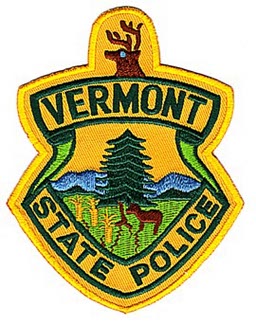
The Vermont State Police (VSP) is the state police agency for the U.S. state of Vermont. The force has jurisdiction throughout the entire state. The Vermont Public Safety Commission directs policy and selects the commander. The commander is Colonel Matthew Birmingham. The Commissioner of the Vermont Department of Public Safety is Michael Schirling. There are 332 sworn state troopers.
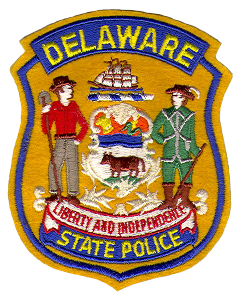
The Delaware State Police (DSP) is a division of the Delaware Department of Public Safety and Homeland Security and is responsible for traffic regulation and law enforcement across the US State of Delaware, especially in areas underserved by local police departments. The DSP is headquartered in the capital Dover, Delaware.

The Florida Highway Patrol (FHP) is a division of the Florida Department of Highway Safety and Motor Vehicles. It is Florida's highway patrol and is the primary law enforcement agency charged with investigating traffic crashes and criminal laws on the state's highways.
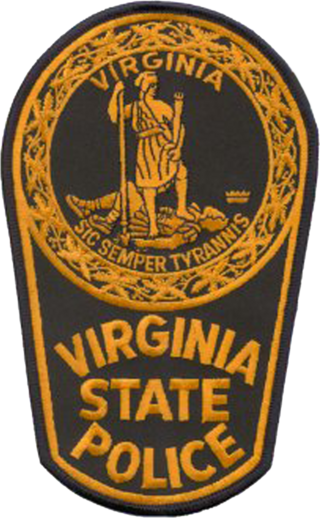
The Virginia State Police, officially the Virginia Department of State Police, conceived in 1919 and established in 1932, is the state police force for the U.S. state of Virginia. The agency originated out of the Virginia Department of Motor Vehicles as an inspector and enforcer of highway laws. It is currently one of fourteen agencies within the Cabinet Secretariat of Public Safety, under the leadership of Secretary Brian Moran until his resignation in January 2022. On January 18, 2018, Gary T. Settle was sworn in as Superintendent of the Virginia State Police. Colonel Settle replaced retiring Colonel W. Steven Flaherty, who had served since 2003.
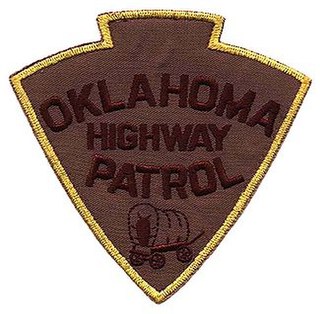
The Oklahoma Highway Patrol (OHP) is a major state law enforcement agency of the government of Oklahoma. A division of the Oklahoma Department of Public Safety, the OHP has traffic enforcement jurisdiction throughout the state. OHP was legislatively created on July 1, 1937, due to the growing problem of motor vehicle collisions, the expansion of highway systems, and the increase in criminal activities.

The Texas Highway Patrol is a division of the Texas Department of Public Safety and is the largest state-level law enforcement agency in the U.S. state of Texas. The patrol's primary duties are enforcement of state traffic laws and commercial vehicle regulation, but it is a fully empowered police agency with authority to enforce criminal law anywhere in the state. Highway patrol troopers are also responsible for patrolling the state Capitol Complex in Austin and providing security to the governor. The current Chief is Lieutenant Colonel Dwight Mathis.

The Mississippi Highway Patrol is the highway patrol and acting state police agency for the U.S. state of Mississippi, and has law enforcement jurisdiction over the majority of the state.
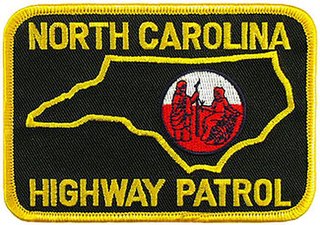
The North Carolina State Highway Patrol (NCSHP) is the highway patrol agency for North Carolina which has no per-se "state police" agency. The Patrol has jurisdiction anywhere in the state except for federal or military installations and on the Cherokee Indian Reservation or on Cherokee outlying lands in the western mountains. NCSHP personnel at times conduct formations, inspections, honor guard activities. The primary mission of the North Carolina State Highway Patrol is to ensure safe and efficient transportation on the streets and highways, reduce crime, protect against terrorism, enforce motor vehicle laws, and respond to natural and man-made disasters.

The Tennessee Highway Patrol (THP) is the State Patrol organization for the U.S. state of Tennessee, responsible for enforcing all federal and state laws relating to traffic on the state's federal and state highways. The agency was created to protect the lives, property, and constitutional rights of people in Tennessee. The THP is a division of the Tennessee Department of Safety and Homeland Security.

Trooper first class is a rank used by several state police agencies within the United States and in some world militaries.

Master trooper is a rank used by several state police agencies within the United States and in some world militaries.

Trooper is a rank used by several civilian state law enforcement organizations in the United States. In its plural form, state troopers, it generally refers to sworn members of a state law enforcement agency, state police, state highway patrol, or state department of public safety, even though those officers may not necessarily be of the rank of trooper.
First sergeant is typically a senior non-commissioned officer rank, used in many countries.

In the United States, the state police is a police body unique to each U.S. state, having statewide authority to conduct law enforcement activities and criminal investigations. In general, state police officers or highway patrol officers, known as state troopers, perform functions that do not fall within the jurisdiction of a county’s sheriff, such as enforcing traffic laws on state highways and interstates, overseeing security of state capitol complexes, protecting governors, training new officers for local police forces too small to operate an academy and providing technological and scientific services. They also support local police and help to coordinate multi-jurisdictional task force activity in serious or complicated cases in states that grant full police powers statewide.
The United States police-rank model is generally quasi-military in structure. A uniform system of insignia based on that of the US Army and Marine Corps is used to help identify an officer's seniority.

















